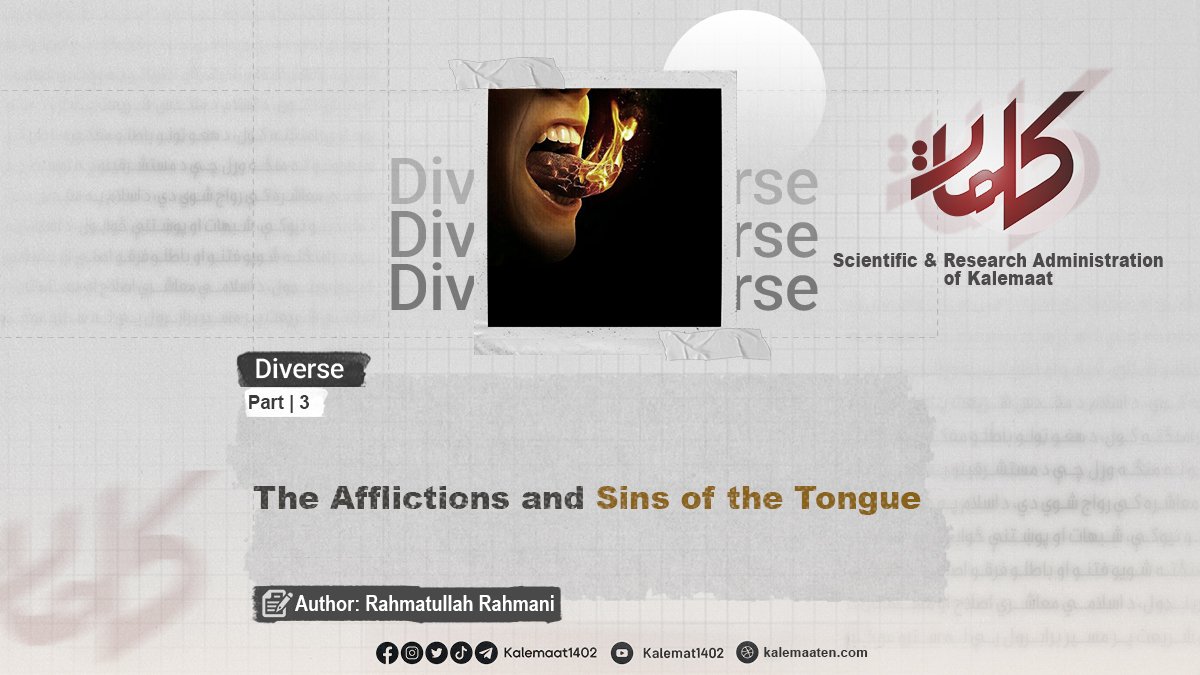
Author: Rahmatullah Rahmani
The Afflictions and Sins of the Tongue (Part Three)
The Second affliction: Talking too much (Talkativeness)
The meaning of talking too much is that a person, for example, can express his/her meaning in one word or one sentence, but expresses the same thing in two words or two sentences. The second sentence and word are called redundant words and excessive talk. Hazrat Ata ibn Abi Rabah (MABH) said: “The community and group that came before you considered redundant talk and the use of repeated words as ugly, except for what was related to the Quran or enjoining good and forbidding evil, and they also considered repeating words permissible due to urgent needs in life.”
Today, some friends, for the sake of entertaining gatherings, do not even think about the fact that all their movements and silences are being recorded. The Prophet (peace and blessings of Allah be upon him) said: «انَّ الرَّجُلَ يَتَكَلَّمُ بِالْكَلِمَةِ يضْحِكُ بِهَا النَّاسَ (او جلساؤه) يَهْوِى بِهَا أَبْعَدَ مِنَ الثُّريّا» Translation: “A person who says something that makes his companions laugh, his value is destroyed by that laughter, like the fall of someone or something from the farthest star in the sky.”
In the words of a scholar who said: “The tongue is in half of the head of a person, and the rest is nothing but flesh and blood.”
One day, a person was talking a lot next to the Prophet (PBUH). The Prophet (PBUH) said: «كَمْ دُونَ لِسَانِكَ مِنْ حِجَابٍ؟» Translation: “How many veils and screens are there in front of your tongue?” The person said: “My two lips and my teeth.” The Prophet (PBUH) said: «اَفَمَا كَانَ لَكَ فِي ذَلِكَ مَا يَرُدُّ كَلَامَكَ؟»
Translation: “Didn’t any of them stop you from speaking?”
Hazrat Ibrahim (PBUH) said: “People are destroyed by two characteristics: 1- Excessive wealth, 2- Excessive talk and superstition.”
Disadvantages of talkativeness
Many sins are committed with the tongue, including backbiting, gossiping, etc.
The positive attitude of people towards the talkative person is often destroyed by inappropriate and incorrect speech; because people think that a talkative person is a liar, and he is lying.
Creating reasons for people to be offended.
Damaging people’s relationships.
Flattery and etc.
How beautifully Hazrat Ali ibn Abi Talib (MABH) said:
أَدَّبْتُ نَفْسي فَما وَجَدْتُ لَها
بِغَيرِ تَقْوَى الأله منْ آدَبِ
في كُل حالاتها وان قِصُرَتْ
اَفْضَلَ منْ صَمْتها عَنِ الْكَذِبِ
و غيبَة النّاسِ آن غيبَتَهُم
حَرْمَها ذُو الْجَلالِ في الكُتُبِ
ان كان من فضّة كَلامُك يا
نَفْسُ فَانّ السكوتَ من ذَهَبٍ
Translation: “I devoted myself to the education and training of my soul, and I did not find a better education for it than piety in all its forms. And if it could not do this, I did not find anything better for it than refraining from lying. And as for the backbiting of people, Allah has forbidden their backbiting in the books with greatness. O soul, if your speech is silver, then silence is gold.”
Translation of Persian Poem:
“Speak little and do not speak except for your own benefit
Do not say anything that is not asked of you in advance
You are given two ears and one tongue from the beginning
That is, listen to two and do not speak more than one”
The Third affliction: Talking about false matters
The meaning of talking about false matters is that, for example, a person has drunk wine, gambled, or committed adultery and describes such sins and explains how they happened. This is one of the Afflictions and sins of the tongue. Sin causes a person to lose his value. Instead of repenting and avoiding these sins, why should we make ourselves sinners again? Allah Almighty describes the conditions of the people of Hell in the Holy Quran as follows: «وَكُنَّا نَخُوضُ مَعَ الْخَائِضِينَ» Translation: “And we were always with the false and the misguided.”
Sometimes a person says something he is not afraid of, but every word drags him to the depths of Hell, and sometimes he says something he is afraid of, but every word raises him to a level where he enters Paradise. Therefore, the best thing to do is to first not sit in such gatherings at all, and secondly, if we are present, prevent them from telling such stories so that we do not hear such stories.
Describing sin to others is a sign of the person committing the sin daring to sin. This is against human nature because human nature demands that a person, after committing a sin, regret his actions and express remorse before Allah. However, a person who boldly praises his actions after committing a sin is against human nature and commits a sin again. Because the tongue actually covers up faults and sins, but if it does not cover up faults in such cases, it has committed the greatest sin. As stated in a hadith: “All members of my Ummah are forgivable except those who commit sins and disobedience clearly and openly.” There is no sin more obvious than this (proudly praising previous sins). Allah, who is the Sattar (the One who covers up faults), did not disgrace him, but he himself proudly confessed his sins and disgraced himself.
Continues…


